
AS Iltija Mufti cast her vote on September 18 and returned to her vehicle, she emerged from the sunroof of her car and chanted, “Zoon Ho, Zoon Ho”, which means “It is the moon, it is the moon”. But it was a sunny day and there was no sighting of the moon. What she intended to convey was “Zeun Ho, Zeun Ho” (We won, we won).
While the mispronunciation of Kashmiri words by Iltija and her mother—former Chief Minister Mehbooba Mufti—has drawn widespread attention in this election, their campaign has reinforced the importance of the Kashmiri language as an integral part of the region’s identity. “Our fight is all about identity. If we abandon the Kashmiri language, where will we end up? We must teach our children Kashmiri,” says Mehbooba, who is also the president of the Peoples Democratic Party (PDP).
In Bijbehara, as in much of Kashmir, young voters are least concerned about Iltija’s Kashmiri pronunciation. Mispronunciation of Kashmiri words by Iltija is often seen as a source of amusement rather than a slight against the language.
Bijbehara constituency, from where Iltija is contesting, holds special significance as it is the hometown of her mother. Iltija’s grandfather, Mufti Mohammad Sayeed, was raised here and started his political career from the region. Iltija is contesting against Bashir Ahmad Veeri, a leader from the National Conference (NC).
The competition, however, has been tough. The ancient town of Bijbehara bears a striking resemblance to the old city of Srinagar. Located on the banks of the Jhelum River, it is encircled by four plateaus, creating a beautiful setting. Much like Srinagar’s old city, Bijbehara features a labyrinth of narrow lanes and by-lanes filled with shops offering a wide array of goods—from copperware to fragrant spices. The town also has numerous bakery shops, attracting travellers headed to south Kashmir or Srinagar.
This story is from the October 11, 2024 edition of Outlook.
Start your 7-day Magzter GOLD free trial to access thousands of curated premium stories, and 9,000+ magazines and newspapers.
Already a subscriber ? Sign In
This story is from the October 11, 2024 edition of Outlook.
Start your 7-day Magzter GOLD free trial to access thousands of curated premium stories, and 9,000+ magazines and newspapers.
Already a subscriber? Sign In
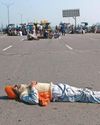
Between Life, Death and Protest
The strain of sustaining a long protest is evident among farmers at Khanauri, but the sense of community remains strong
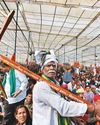
Protest 2.0
Farmers still have hopes from their leaders, but time is running out. The enemies, in the meanwhile, are sharpening their weapons

Trajectory of Nowhere
In the context of space and time, who are we humans and do we even matter?

All of God's Men
THE ongoing Maha Kumbh at Prayagraj is a spectacle, a photo op, and an emotion and manifestation of the mixing of spirituality and faith.
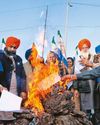
Embers Rekindled
While the recent death by suicide of a farmer has rendered the mood sombre at Shambhu border, the protests have picked momentum at the call of the unions

Time for Course Correction
What the protest by Punjab's landed peasantry tells us about the state's economy and society

The Untouchable
The ideological chasm between Ambedkar's vision and the Hindutva worldview remains irreconcilable
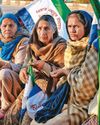
Frontliners
A day in the life of women protesting at Shambhu border
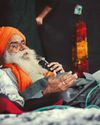
The Farmer-Composing Antagonist
Farmer leader Jagjit Singh Dallewal has been on a fast-unto-death at Khanauri border to pressurise the government to fulfil its promises to the farming community
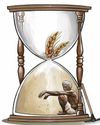
Till Death Do Us Part
Jagjit Singh Dallewal has reinforced how a fast unto death can serve as a warning and an appeal to the public and the government